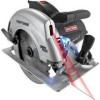Craftsman 7-1/4 Operation Manual - Page 10
Warning - saw blade
 |
View all Craftsman 7-1/4 manuals
Add to My Manuals
Save this manual to your list of manuals |
Page 10 highlights
SAFETY RULES FOR CIRCULAR SAWS cont, 12o NEVER use damaged or incorrect blade washers or bolts. The blade washers and bolts were specially designed for your saw, for optimum performance and safety of operation. 13. NEVER cut more than one piece at a time. DO NOT STACK more than one workpiece on the worktable at a time. 14_ AVOID awkward operations and hand positions where a sudden slip could cause your hand to move into the blade, 15, NEVER reach into the cutting path of the blade. WARNING: Use of this product can generate dust containing chemicals known to cause cancer, birth defects or other reproductive harm. Some examples of these chemicals are: • Lead from lead-based paints.. • Crystalline silica from bricks and cement and other masonry products_ • Arsenic and chromium, from chemically treated lumber, Your risk from these exposures varies, depending upon how often you do this type of work.To reduce your exposure to these chemicals'. • Work in a well-ventilated area, . Work with approved safety equipment, such as those dust masks that are specially designed to filter out microscopic particles. Avoid prolonged contact with dust from power sanding, sawing, grinding, drilling and other construction activities. Wear protective clothing and wash exposed areas with soap and water. Allowing dust to get into your mouth, eyes, or lay on the skin may promote absorption of harmful chemicals. z_ WARNING: Use of this tool can generate and/or disburse dust, which may cause serious and permanent respiratory or other injury, Always use NIOSH/OSHA approved respiratory protection appropriate for the dust exposure. Direct particles away from face and body. ADDITIONAL RULES FOR SAFE OPERATION I t,o/_follWowARalNl iInNsGtru: ctioBnEs listed below SURE to read may and result in electric shock, fire understand all instructions. and/or Failure serious personal injury, 1, Know your power tool, Read operator's manual carefully. Learn the applications and limitations, as well as the specific potential hazards related to this tool.. Following this rule will reduce the risk of electric shock, fire or serious injury. 2_ ALWAYS wear safety glasses or eye shields when using this saw. Everyday eyeglasses have only impact-resistant lenses; they are NOT safety glasses_ 3_ PROTECT your lungs. Wear a face mask or dust mask if the operation is dusty. 4o PROTECT your hearing. Wear appropriate personal hearing protection during use. Under some conditions and duration of use, noise from this product may contribute to hearing loss, 5. ALL VISTORS AND BYSTANDERS MUST wear the same safety equipment that the operator of the saw wears_ 10















